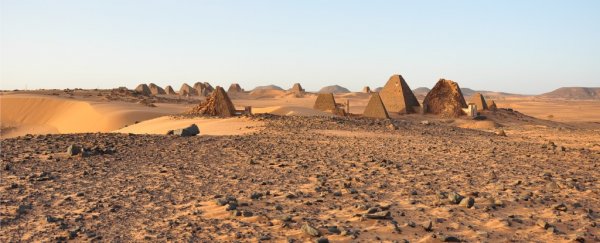Thanks to the movies, when most of us form a mental image of a pyramid, we transport ourselves to Egypt where those massive, triangular tombs are pretty much synonymous with the country itself.
There's one problem - despite what many of us might have assumed, Egypt isn't the pyramid capital of the world, or even northern Africa. That honour belongs to Egypt's southern neighbour: Sudan.
Yup, the country with the most pyramids in the world is Sudan, and we aren't being sticklers for details here. Sudan has between 200 to 255 known pyramids, compared to Egypt's 138, and no, they weren't created by ancient Egyptians who might have wandered further south.
Instead, the pyramids in Sudan were built by members of the Kingdom of Kush, an ancient civilisation that ruled areas along the Nile River from 1070 BC to 350 AD.
While the Kushites started building pyramids about 500 years after the Egyptians were over them, both cultures used them to entomb their dead.
As Fiona MacDonald reported for us last year:
"Just like the Egyptians, the Kushites entombed their royalty below lofty pyramids - presumably to help their souls reach up to the heavens - but structurally, the buildings are quite different. For starters, the Nubian pyramids are far steeper and narrower, and they're built from stepped stones, as opposed to the smooth surfaces of the wider Egyptian pyramids."
The sizes of the pyramids differ a lot, too. The average Kushite pyramid stands roughly 6 to 30 metres (20 to 98 feet) tall, while the average Egyptian pyramid is roughly 138 metres (453 feet).
One of the biggest concentrations of Kushite pyramids is the ancient city of Meroë, which lies near the middle of modern day Sudan. This city alone contains roughly 200 out the country's 255 pyramids, suggesting that at some point, it was a thriving metropolis.
Despite knowing who built them and around what time period, researchers still have a lot of questions about the Sudanese pyramids that they still can't fully answer.
Did they use the same methods employed by the Egyptians? How long did it take for one to be erected? What happened to the society as whole? Right now, no one's quite sure.
The good news is that teams of archaeologists are currently working in Meroë to figure this out. One of the neatest ways archaeologists are doing this is by employing drones to scan the area from above.
As National Geographic shows in this video:
Besides not having the most pyramids, Egypt is also not home to the world's largest pyramid, either. For that, you'd have to travel to Mexico's Great Pyramid of Cholula, which is actually hidden inside a mountain.
So, just because Egypt's pyramids are the most talked-about in pop culture, doesn't mean the nation is the only one to have some seriously awesome ones.
And we still have so much to learn about the secrets they hide.
